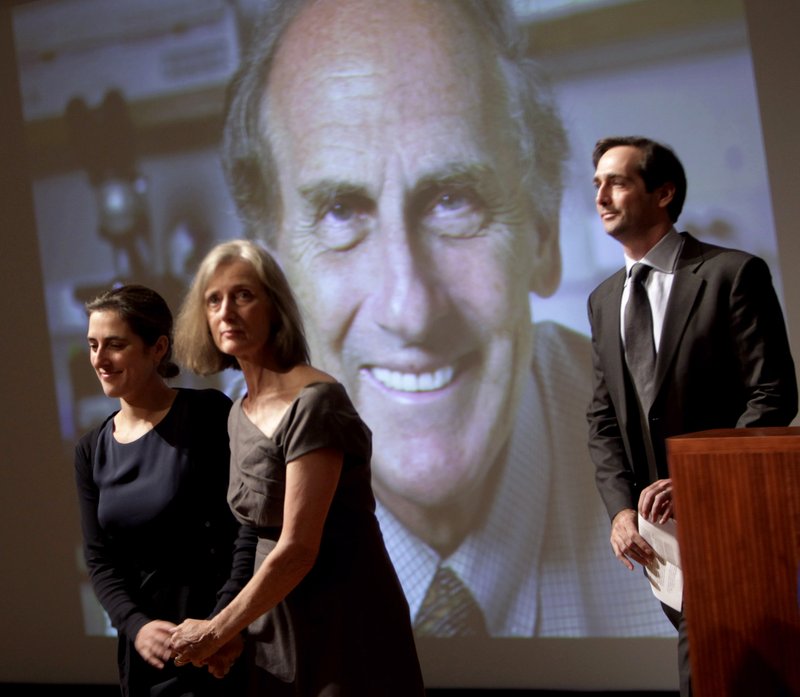NEW YORK – Ralph Steinman, a pioneer in understanding how cells fight disease, tried to help his own immune system thwart his pancreatic cancer.
He survived until Friday. Three days later, he was awarded the Nobel Prize for medicine.
The Nobel committee, unaware of his death, announced the award Monday in Stockholm. Steinman’s employer, Rockefeller University in New York, learned of his death after the Nobel announcement.
Steinman’s wife, Claudia, said the family had planned to disclose his death Monday — only to find an email to his cellphone from the Nobel committee.
Experts disagree whether his research helped him live for 4½ years after he was diagnosed. A colleague in his lab thinks it did. The odds of making it even a year with his type of cancer are less than 5 percent.
Nobel officials said they believed it was the first time that a laureate had died before the announcement without the committee’s knowledge.
Since 1974, the Nobel statutes don’t allow posthumous awards unless a laureate dies after the announcement but before the Dec. 10 award ceremony. That happened in 1996 when economist William Vickrey died a few days after the announcement.
However, the committee said Monday that Steinman’s award would stand and that his survivors would receive his share of the $1.5 million prize.
The Canadian-born Steinman was awarded the prize along with American Bruce Beutler and French scientist Jules Hoffmann. They were honored for discoveries about the body’s disease-fighting immune system.
Steinman, 68, discovered so-called dendritic cells in 1973. These cells regulate the activity of other cells.
“When he got sick, he realized he needed to call upon these cells to induce a strong enough immune response to fight his tumor,” said Dr. Sarah Schlesinger, clinical director for his lab.
Steinman tried eight to 10 government-approved experimental therapies, she said.
Colleagues came forward with their best approaches for other kinds of cancer, and Steinman analyzed what seemed the most promising for him.
In one approach, for example, samples of Steinman’s own dendritic cells were loaded with protein markers from his tumor, and then reinjected into his body. The idea was that this would “teach his immune system how to respond to that tumor,” said Rockefeller colleague Dr. Michel Nussenzweig.
Although he also underwent chemotherapy, “he didn’t really want to take it because he wanted to be cured,” Nussenzweig said. “And he felt the immune system would be the best way to effect a cure, as opposed to just living with the disease.”
The experimental therapy ended just recently, he said, but “there’s no way of knowing whether it worked or not.”
Steinman was the only patient, with no control group — other patients with the same cancer for comparison, a scientific must for convincing evidence.
Rockefeller University said “his life was extended” using the therapy of his own design. Schlesinger believes that, pointing to the poor survival odds for his tumor and his good quality of life during his treatment. Noting that he also got chemotherapy, she said, “I think it all worked together.”
But Dr. Alan Venook, a pancreatic cancer specialist at the University of California, San Francisco, cautioned against drawing conclusions about the impact of the treatments.
He said surviving four years with pancreatic cancer “is a long time,” but not out of the question, depending on the type and how advanced it was when it was found.
“It’s a disservice to the field for anyone to say that his immune therapy prolonged his life,” Venook added.
Send questions/comments to the editors.



Success. Please wait for the page to reload. If the page does not reload within 5 seconds, please refresh the page.
Enter your email and password to access comments.
Hi, to comment on stories you must . This profile is in addition to your subscription and website login.
Already have a commenting profile? .
Invalid username/password.
Please check your email to confirm and complete your registration.
Only subscribers are eligible to post comments. Please subscribe or login first for digital access. Here’s why.
Use the form below to reset your password. When you've submitted your account email, we will send an email with a reset code.